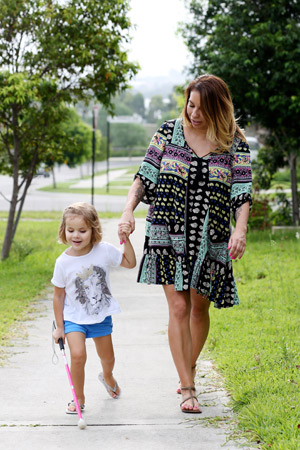When a child is born blind or with low vision, it can leave a family feeling desperate and unable to cope.
“I cried for a whole year. I was so depressed. I couldn’t accept it and I wouldn’t go out of the house, and I didn’t want anyone to look at her. I was a mess.” – Jeanette, mum to 4-year-old Kaylah
 But thanks to Vision Australia’s supporters, these mums and dads don’t have to be left feeling overwhelmed or alone.
But thanks to Vision Australia’s supporters, these mums and dads don’t have to be left feeling overwhelmed or alone.
With the help of our supporters Vision Australia give’s families like Kaylah’s the skills and knowledge they need to help their child develop into a happy and confident little person.
When Kaylah was five weeks old, Jeanette noticed that her daughter wasn’t following her with her eyes like her other two children had done
That first year was harrowing - filled with uncertainties, unanswered questions and extensive genetic testing before Kaylah was finally diagnosed with Leber’s congenital amaurosis – she is blind but has some light perception and can make out people and objects as shadows.
In the midst of all this uncertainty, Kaylah’s family was placed in contact with physiotherapists and early childhood educators at Vision Australia.
Kaylah was then taught how to carry out body movements that require the use of her larger muscles like sitting, standing and walking. These have all helped her to explore environments like her home and her pre-school on her own.
Kaylah is a fast learner and her parents now know how to encourage her to learn and develop these basic but necessary skills.
As a result, this determined little four-year-old has mastered things like how to use a spoon, and how to throw and kick a ball. She now also gets around using her hot pink cane like a pro!
Kaylah has also been introduced to braille so she can develop her grammar and literacy skills. At the moment Kaylah’s just pressing all the buttons, learning the pressure she has to put on it and at the same time developing her hand strength.
When children would normally scribble, Kaylah is on the brailler, as Jeanette said: “She knows I’m on my braille machine, and that you press these little buttons to write.”
Thanks to our donors continued support we will be able to help Kaylah and her family through a new set of challenges when Kaylah starts primary school next year.
“I cried for a whole year. I was so depressed. I couldn’t accept it and I wouldn’t go out of the house, and I didn’t want anyone to look at her. I was a mess.” – Jeanette, mum to 4-year-old Kaylah
 But thanks to Vision Australia’s supporters, these mums and dads don’t have to be left feeling overwhelmed or alone.
But thanks to Vision Australia’s supporters, these mums and dads don’t have to be left feeling overwhelmed or alone.With the help of our supporters Vision Australia give’s families like Kaylah’s the skills and knowledge they need to help their child develop into a happy and confident little person.
When Kaylah was five weeks old, Jeanette noticed that her daughter wasn’t following her with her eyes like her other two children had done
That first year was harrowing - filled with uncertainties, unanswered questions and extensive genetic testing before Kaylah was finally diagnosed with Leber’s congenital amaurosis – she is blind but has some light perception and can make out people and objects as shadows.
In the midst of all this uncertainty, Kaylah’s family was placed in contact with physiotherapists and early childhood educators at Vision Australia.
Kaylah was then taught how to carry out body movements that require the use of her larger muscles like sitting, standing and walking. These have all helped her to explore environments like her home and her pre-school on her own.
Kaylah is a fast learner and her parents now know how to encourage her to learn and develop these basic but necessary skills.
As a result, this determined little four-year-old has mastered things like how to use a spoon, and how to throw and kick a ball. She now also gets around using her hot pink cane like a pro!
Kaylah has also been introduced to braille so she can develop her grammar and literacy skills. At the moment Kaylah’s just pressing all the buttons, learning the pressure she has to put on it and at the same time developing her hand strength.
When children would normally scribble, Kaylah is on the brailler, as Jeanette said: “She knows I’m on my braille machine, and that you press these little buttons to write.”
Thanks to our donors continued support we will be able to help Kaylah and her family through a new set of challenges when Kaylah starts primary school next year.










